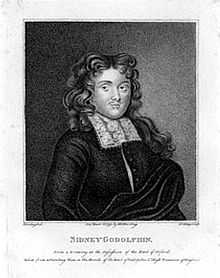Sidney Godolphin (poet)

Sidney Godolphin (1610 (baptised) – 9 February 1643) was an English poet, courtier and politician who sat in the House of Commons between 1628 and 1643. He died fighting in the Royalist army in the English Civil War.
Biography
Godolphin was the second son of Sir William Godolphin (died 1613) of Godolphin, Cornwall, by his wife, Thomasin, and was baptised on 15 January 1610. He was admitted a commoner of Exeter College, Oxford, 25 June 1624, aged 18,[1] remained there for three years, and afterwards entered one of the inns of court, and travelled abroad. He was elected Member of Parliament MP for Helston in 1628 and sat until 1629 when King Charles decided to rule without parliament for eleven years.[2]
Godolphin was elected again as MP for Helston to the Short Parliament in March 1640, and to the Long Parliament in October 1640.[2] He was known as an adherent of Strafford, and was one of the last royalist members to leave the house. When the civil war broke out, he made a final speech of warning, and left to raise a force in Cornwall. Despite his diminutive stature he, refusing an officer's commission and choosing to serve as a trooper, joined the cavalry of the army commanded by Sir Ralph Hopton, which crossed the Tamar and advanced into Devon.[3] Their declaration signed by Godolphin is in ‘Lismore Papers’. Godolphin, whose advice, according to Clarendon, was highly valued by the commanders in spite of his lack of military experience, was shot in a skirmish at Chagford.
Godolphin was buried in the chancel of Okehampton Church on 10 February 1643.[1] His will, dated 23 June 1642, containing a bequest of £200 to Thomas Hobbes. He gave some plate to Exeter College, Oxford.
Poems
Godolphin left poems which were never collected in a separate volume. "The Passion of Dido for Æneas, as it is incomparably expressed in the fourth book of Virgil," finished by Edmund Waller, was published in 1658 and 1679, and is in the fourth volume of Dryden's Miscellany Poems. He was one of "certain persons of quality" whose translation of Pierre Corneille's The La Mort de Pompée was published in 1664. A song is in George Ellis's Specimens of the Early English Poets, and another in the Tixall Poetry. Other poems in manuscript are in the Harleian MSS. (6917) and the Malone MSS. in the Bodleian Library. Commendatory verses by him are prefixed to Sandys's Paraphrase (1638), and an "epitaph upon the Lady Rich" is in John Gauden's Funerals made Cordial (1658).
Haunting
It is alleged that Godolphin's ghost haunts The Three Crowns Hotel in Chagford. He is said to stride the corridors in full uniform.[4]
Notes
- ↑ 1.0 1.1 'Alumni Oxonienses, 1500–1714: Gilpin-Greenhaugh', Alumni Oxonienses 1500–1714: Abannan-Kyte (1891), pp. 569–599. Date accessed: 24 February 2011
- ↑ 2.0 2.1 Willis, Browne (1750). Notitia Parliamentaria, Part II: A Series or Lists of the Representatives in the several Parliaments held from the Reformation 1541, to the Restoration 1660 ... London. pp. 229–239.
- ↑ History of Parliament Online article.
- ↑ Haunted Places. hauntedplaces.co.uk
References
 This article incorporates text from a publication now in the public domain: "Godolphin, Sidney (1610–1643)". Dictionary of National Biography. London: Smith, Elder & Co. 1885–1900.
This article incorporates text from a publication now in the public domain: "Godolphin, Sidney (1610–1643)". Dictionary of National Biography. London: Smith, Elder & Co. 1885–1900.
| Parliament of England | ||
|---|---|---|
| Preceded by Francis Godolphin Francis Carew |
Member of Parliament for Helston 1628–1629 With: William Noy |
Succeeded by Parliament suspended until 1640 |
| Preceded by Parliament suspended since 1629 |
Member of Parliament for Helston 1640–1643 With: William Godolphin 1640 Francis Godolphin |
Succeeded by John Penrose John Thomas |
| Honorary titles | ||
| Preceded by William Godolphin |
Governor of the Isles of Scilly 1636–1643 |
Succeeded by Francis Godolphin |
|